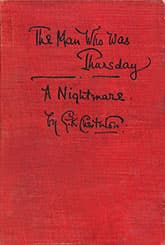The Man Who Was Thursday
 First edition
First editionOriginal title
The Man Who Was Thursday: A Nightmare
First publication
1908
Literature form
Novel
Genres
Literary, mystery, fantasy
Writing language
English
Author's country
England
Length
approx. 58,000 words
A spiritual mystery
If you come to G.K. Chesterton's avowed masterpiece expecting a piece of early twentieth-century realism, you're going to be very surprised.
If you've heard it's a mystery—hopefully along the lines of the author's beloved Father Brown stories—you may also be very disappointed.
In fact, I can't think of anything that might prepare you for The Man Who Was Thursday.
I, for one, still don't get it. Yes, it's a Christian allegory, a morality tale, a comment on the decadence of Western society and the deep need for a spiritual foundation. All that. It's obvious.
But I don't get it as a novel. Once past the first few intriguing chapters, it never feels right as a story one could care about.
God or Satan?
It starts as a mystery or an early thriller.
Poet-turned-detective Gabriel Syme uncovers an anarchist conspiracy against the world. Members of the gang he infiltrates are named after the days of the week. He becomes Thursday. The kingpin is Sunday, who is the most enigmatic figure and the key to uncovering the real, apocalyptic goal of the secret organization. Is he God or is he Satan?
Everyone talks like Chesterton at his paradoxical wittiest in aphorisms that defy logic, turning good and evil upside-down. The narrative similarly twists and turns, at every juncture overthrowing what you may think you knew before (though some of the "surprises" may appear predictable).
The Annotated Thursday, an edition of The Man Who Was Thursday with notes by the very non-religious Martin Gardner, is particularly useful for understanding this often hard-to-follow novel.
By the way, Chesterton in an article denied the story is a Christian allegory, pointing to the novel's original subtitle, A Nightmare, and claiming it's just a whimsical tale about the duality of hope and despair.
But why all the Christian imagery then?
Still worth reading
Admittedly, The Man Who Was Thursday has its fans. You can find plenty of recent readers rhapsodizing about it online. It's also supposed to have influenced a wide range of writers—including thriller novelists, humorists and writers of the absurd (including Franz Kafka, no less).
The story has been adapted for radio broadcast several times, including once by Orson Welles.
And to be fair, despite the above warnings, The Man Who Was Thursday is worth reading, if only to participate in the mystery. First of all, in the mystery of what it's all about as you're reading it. And, second, in the mystery of how this hard-to-fathom novel can have the power to keep you wondering long after you've finished it.
— Eric

